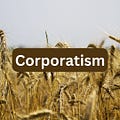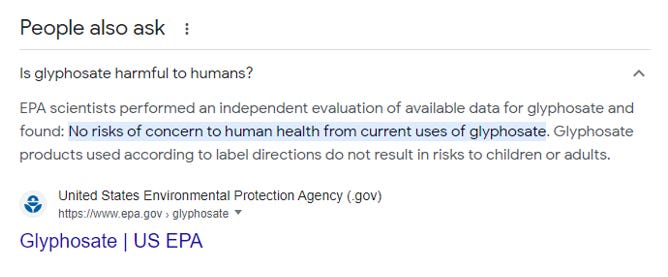I’m now spending time trying to understand the Glyphosate story.
I’ve walked past the entry to this rabbit hole many times, but bandwidth not allowing, I kept walking to some other subject that was vying for my attention.
I’ve decided it’s time to wrap my head around it.
There are so many threads to the Glyphosate story. The damage caused by it is frankly overwhelming. Just a few of the threads that come to mind are:
Destruction of soil
Destruction of nutrient uptake into crops
Destruction of bee colonies
Destruction of human gut microbiome
Destruction of human protein synthesis
Gluten allergies and Celiac’s disease
Emergence of antibiotic resistant super bugs
There are other threads, but you get the picture.
The scale of damage is frankly hard to comprehend.
But we have this from Google and the EPA.
I watched a discussion that Bobby had with Mark Hyman, about glyphosate, from two years ago (video below), and the gem that I’ve pulled out into the masthead was right at the end.
I feel I’m finally ready to understand his articulation of Corporatism.
It reminds me of the great article that Toby Rogers wrote back in January 2023.
Big Food + Big Ag
(PepsiCo, Tyson, Nestle, Kraft, Cargill, ADM)
Control the U.S. Department of Agriculture.
Result: Subsidies for sugar and corn. Junk food served in schools across the country. Obesity, diabetes, mental illness, and low energy plague our nation.Big Chem
(Dow, ExxonMobil Chemical, Dupont, Eastman, Bayer, Syngenta)
Controls the Environmental Protection Agency.
Result: 80,000 chemicals are on the market and we have no data to verify whether they are safe.
You will notice that Monsanto is surprisingly absent from the cartel list, that is because Bayer bought them in 2018. Bobby’s discussion with Hyman sheds a lot of light on that purchase.
Executive Summary:
The video is a conversation between Dr. Mark Hyman and Robert F. Kennedy Jr., an environmental attorney, about the dangers of glyphosate, a key ingredient in Monsanto's Roundup weed killer. The discussion revolves around the health and environmental impacts of glyphosate, the legal battles against Monsanto, and the influence of corporations on government agencies.
Kennedy explains that glyphosate, a herbicide, is a probable human carcinogen. He discusses his involvement in lawsuits against Monsanto, where he represented individuals who developed non-Hodgkin's lymphoma after using Roundup. The lawsuits resulted in significant financial judgments against Monsanto, largely due to evidence that the company knew about the potential risks of glyphosate but failed to warn consumers.
Kennedy also discusses the concept of "agency capture," where regulatory agencies are influenced or controlled by the industries they are supposed to regulate. He provides examples from his legal cases, showing how Monsanto had significant influence over the Environmental Protection Agency (EPA). He argues that this influence has led to inadequate regulation and oversight of harmful chemicals like glyphosate.
The conversation also touches on the broader impacts of glyphosate on the environment. Glyphosate is harmful to the soil microbiome, which is essential for healthy soil and carbon sequestration. The widespread use of glyphosate has therefore contributed to soil degradation and climate change.
Towards the end of the video, Kennedy and Hyman discuss the broader issue of corporate influence on democracy. They argue that corporations have too much power over government agencies and policies, leading to decisions that prioritize corporate interests over public health and the environment.
20 Key Points:
Glyphosate, a key ingredient in Monsanto's Roundup weed killer, is a probable human carcinogen.
Robert F. Kennedy Jr. has represented individuals in lawsuits against Monsanto who developed non-Hodgkin's lymphoma after using Roundup.
These lawsuits have resulted in significant financial judgments against Monsanto.
Evidence from these lawsuits suggests that Monsanto knew about the potential risks of glyphosate but failed to warn consumers.
The concept of "agency capture" refers to regulatory agencies being influenced or controlled by the industries they are supposed to regulate.
Kennedy provides examples from his legal cases showing how Monsanto had significant influence over the Environmental Protection Agency (EPA).
This influence has led to inadequate regulation and oversight of harmful chemicals like glyphosate.
Glyphosate is harmful to the soil microbiome, which is essential for healthy soil and carbon sequestration.
The widespread use of glyphosate has therefore contributed to soil degradation and climate change.
Kennedy and Hyman discuss the broader issue of corporate influence on democracy.
They argue that corporations have too much power over government agencies and policies.
This corporate influence leads to decisions that prioritize corporate interests over public health and the environment.
Monsanto's influence over the EPA is an example of this corporate influence.
The repeal of the Fairness Doctrine and the Citizens United ruling have further increased corporate influence over government and media.
The Fairness Doctrine required broadcasters to present controversial issues of public importance in a manner that was honest, equitable, and balanced.
The Citizens United ruling allowed corporations to spend unlimited amounts of money on political campaigns.
Kennedy argues that these changes have undermined democracy and led to a "corporate kleptocracy."
Kennedy and Hyman argue for the importance of litigation in holding corporations accountable and revealing their influence over government.
They also stress the importance of an informed public and independent press in maintaining a functioning democracy.
Despite the challenges, Kennedy remains committed to his legal work and believes in the possibility of change.
For me, this connects with Toby’s recent article.
Summary and takeaways:
The central theme of the article is the need to reassess our understanding of the economy in light of the mass poisoning caused by industries like Pharma, which have rendered existing economic models obsolete.
Key takeaways from the article include:
The current U.S. economy is centered around industries that produce poison, such as Pharma, pesticides, plastics, war, energy, and big media industries that numb society's awareness of the problems caused by these industries.
Big Finance and Big Tech/Big Data play a significant role in supporting and manipulating these industries, leading to a form of fascism where government becomes a subsidiary of industry.
The short-term economic benefits of these industries, such as increased GDP through pharmaceutical sales, mask the long-term costs of widespread health issues and societal consequences.
The mass poisoning economic system perpetuated by industries like Pharma and coal creates the illusion of prosperity based on increased economic activity but leads to poor health and happiness for individuals, families, and the nation.
The ruling class profits from the mass poisoning system, while the rest of society suffers the physical, emotional, and financial consequences.
The cultural system perpetuates amnesia and distracts individuals from recognizing the harm caused by these industries through streaming services, social media, and propaganda in the mainstream news media.
Traditional economic topics like taxation, trade, and debt become insignificant in the face of the urgent need to address the mass poisoning system.
The author acknowledges the challenges of confronting the poisonous industries that have political and cultural influence but believes it is possible to change the economy and address societal collapse.
Quotes:
"The United States is now organized around producing poison, war, energy, and forgetting. Because these big industries own the political and regulatory system we are now living under a new form of fascism."
"Pharma and other poisonous industries are mining our bodies for profits. It is the worst possible economy one can have and the greatest transfer of wealth to the ruling class in history."
"The entire way that we think about the economy has to change because we are living in the era of the iatrogenocide."
This reminds me of a Twitter thread from Bill Ackman recently. I didn’t know who Ackman was until a friend pointed him out to me as an example of someone who was beginning to wake up, prompted by Bobby’s recent Rogan podcast.
Here is a section of his long tweet:
Imagine, however, if:
(1) you could create a drug in a much shorter period of time, a year or two, rather than 10-15 years, and the total cost to get it approved and marketed to patients was a fraction of the cost of a typical drug.
(2) the new drug is prescribed for everyone, regardless of their health, and therefore the market for the drug is every newborn or potentially everyone on the planet.
(3) the drug is prescribed for everyone regardless of their age or consent and they need to take it in order to attend school or keep their job, and the gov’t pays for it.
(4) the patients who are prescribed the drug are of an age where they are incapable of assessing the risk versus the reward for taking the drug.
(5) the drug needs to be taken every year regardless of the health of the individual who takes it.
(6) the drug companies who manufacture these new drugs are exempt from liability for these drugs even if they cause serious harm or death.
and
(7) drug companies are: (a) permitted to advertise on TV and on other media and are one of the largest sources of revenues for the news media who are responsible for educating the public about risks to public health and safety, and (b) the drug companies are also major lobbyists to the government and funders of the FDA.
If (1) - (7) were true:
and you were a drug company, you would seek to obtain approval for as many of the above drugs as possible, as the above drugs would have the lowest R&D costs, the fastest time to market, the lowest marketing costs, the largest addressable market, and no liability.
You would be crazy not to develop as many of the above drugs as possible and do everything possible to convince the government to make them standard of care, and motivate the public to take them.
If you were a citizen, however, you would want the above drugs to receive the highest scrutiny for safety and efficacy, and you would want longitudinal studies to understand the long-term effects and the potential cumulative effects of these drugs, in particular, on children.
Now, if the number of doses of these drugs taken by children increased from 3 to 72 in the last 30 or so years, and over the same period there was a massive unexplained increase in the percentage of kids that suffered from debilitating diseases like autism and other less debilitating, but concerning issues, like allergies and eczema, you would look deeper until you understood what was causing the massive increase in these issues.
I see Glyphosate, Fluoride, and childhood vaccination through the lens of chronic disease. There is little money and power in health and death.
I see chronic disease through the lens of Wealth Transfer. If I can make you just sick enough, for long enough, and I have the solutions you need, you will transfer your wealth to me.
I see wealth transfer through the lens of Empire.
A sick nation will borrow from Empire (in US dollars) to buy the solutions for its people from Empire (in US dollars), thus transferring a nations sovereignty and wealth to Empire.
Chronic disease is the building block of modern Empire. It is far more valuable that military might.
Empire is Corporatism.
Corporatism is Empire.
Thanks for being here.
Please consider a small paid subscription (donation). The money goes to help covid vaccine injured Australians.
I am always looking for good, personal GMC, covid and childhood vaccination stories. You can write to me privately: unbekoming@outlook.com
If you are Covid vaccine injured, consider the FLCCC Post-Vaccine Treatment
If you want to understand and “see” what baseline human health looks like, watch (and share) this 21 minutes
If you want to help someone, give them a book. Official Stories by Liam Scheff. Point them to a safe chapter (here and here), and they will find their way to vaccination.
Here are three eBooks I have produced so far:
FREE eBook: A letter to my two adult kids - Vaccines and the free spike protein








Corporatism